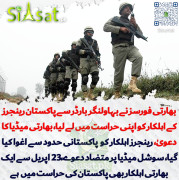You are using an out of date browser. It may not display this or other websites correctly.
You should upgrade or use an alternative browser.
You should upgrade or use an alternative browser.
YouTube Has Been Restricted In Japan. A Last Message Sent Out From Man In Japan.
biomat
Minister (2k+ posts)
Nawazish
Minister (2k+ posts)
Mounting Japan Crisis Sparks Warnings to Leave Tokyo
Army helicopters have dumped tons of water on the damaged nuclear reactors in a desperate attempt to cool radioactive fuel, but the crisis continues to escalate.
Thu Mar 17, 2011 05:06 AM ET
Content provided by AFP

Alarm over Japan's nuclear crisis grew on Thursday as army helicopters water-bombed an overheating power plant and foreign governments urged citizens to leave Tokyo.
Airline tickets were scarce and firms hired private jets to evacuate staff as countries from the United States to Europe and Australia warned their citizens to get out of Tokyo.
The US chartered aircraft to take Americans out of the country, China moved thousands of its citizens to Tokyo for evacuation, and France assigned two government planes to pull its people out.
At the stricken plant itself, Chinook helicopters dumped tonnes of water in a desperate effort to cool reactors crippled by Friday's massive earthquake and tsunami, which pulverised the northeast coast and left countless thousands homeless and enduring bitterly cold conditions.
Looking to help the victims of the disaster in Japan? Make your contribution to GlobalGiving's relief fund here.
The official toll of the dead and missing now exceeds 14,650, police said, with the number of confirmed dead at 5,178 in the country's biggest catastrophe since World War II.
As Japanese and international teams mounted a massive search and relief effort, reports from some battered coastal towns suggested the final toll could be far higher.
PLANET GREEN: Japan's Nuclear Crisis Sparks Panicked Food Shopping
Millions have been left without water, electricity, fuel or enough food and hundreds of thousands more are homeless, the misery compounded by heavy snowfalls, freezing cold and wet conditions.
The tense nation also saw the stockmarket fall again Thursday, closing down 1.44 percent on fears about the economic impact -- concerns that have also seen global stocks drop.
The massive 9.0 magnitude earthquake shifted Japan more than two metres away from the neighbouring Korean peninsula, scientists said.
The helicopter operation at the Fukushima No. 1 power plant on the Pacific coast, some 250 kilometres (155 miles) northeast of Tokyo, aims to keep the fuel rods inside reactors and containment pools submerged under water.
The latest threat at the plant was the fuel-rod pools, which contain used fuel rods that have been withdrawn from reactors yet remain highly radioactive.
They are immersed in cooling water for many years until they shed enough heat to become manageable for storage.
Water in one of the pools was evaporating because of the rods' heat, and temperatures were slowly rising in two other pools because coolant pumps were knocked out by the March 11 tsunami, experts say.
They warned that if the tanks run dry and leave the fuel rods exposed, the rods could melt or catch fire, creating potentially lethal levels of radiation.
At the same time, Japanese engineers were focused on restoring the power supply to the stricken power plant in an attempt to reactivate its cooling system.
"If the restoration work is completed, we will be able to activate various electric pumps and pour water into reactors and pools for spent nuclear fuel," a spokesman for Plant operator Tokyo Electric Power Co. told AFP.
US President Barack Obama offered to give Japan any support that it needs, in a telephone call with Prime Minister Naoto Kan, the Japanese leader's spokesman said.
But as crews battled to prevent an atomic disaster, more foreign governments urged their citizens to steer clear of quake-stricken northeast Japan and the capital Tokyo.
"If you're in Tokyo or any of the affected prefectures... we are saying that you should depart," said Australian Foreign Minister Kevin Rudd.
Britain, France, Germany, Italy, The Netherlands and New Zealand also advised nationals to leave or shun the northeast region.
Indian technology firms were helping employees to leave, with software firm L&T Infotech saying it had chartered a plane to take all 185 of its staff and their families out of Japan.
US officials warned nationals living within 80 kilometres (50 miles) of the crippled Fukushima nuclear plant to evacuate or seek shelter.
The Japanese government has told people living up to 10 kilometres (six miles) beyond a 20-kilometre exclusion zone around the plant to stay indoors. More than 200,000 people have already been evacuated from the zone.
The evacuation plans came against a background of mounting concern over the possibility of a nuclear catastrophe.
"The site is effectively out of control," the European Union's energy chief Guenther Oettinger told a European Parliament committee, a day after he said Japan was facing "apocalypse".
France's Nuclear Safety Authority said the disaster now equated to a six on the seven-point international scale for nuclear accidents, ranking the crisis second in gravity only to the level-seven Chernobyl disaster in 1986.
US Energy Secretary Steven Chu said the events in Japan "actually appear to be more serious" than the 1979 accident at Three Mile Island, a partial reactor meltdown that led to small releases of radioactivity.
"To what extent we don't really know now," Chu said in Washington.
Gregory Jaczko, chair of the US Nuclear Regulatory Commission, warned there was no water left in the spent fuel pool of the plant's number-four reactor, resulting in "extremely high" radiation levels.
The UN's International Atomic Energy Agency chief Yukiya Amano said the situation was "very serious" as he prepared to fly out to see the damage for himself.
Japan's chief government spokesman Yukio Edano said radiation levels from the plant posed no immediate health threat outside the 20-kilometre exclusion zone despite slightly elevated levels detected in Tokyo over the past few days.
http://news.discovery.com/earth/japan-nuclear-crisis-warnings-leave-tokyo-110317.html
Army helicopters have dumped tons of water on the damaged nuclear reactors in a desperate attempt to cool radioactive fuel, but the crisis continues to escalate.
Thu Mar 17, 2011 05:06 AM ET
Content provided by AFP

Alarm over Japan's nuclear crisis grew on Thursday as army helicopters water-bombed an overheating power plant and foreign governments urged citizens to leave Tokyo.
Airline tickets were scarce and firms hired private jets to evacuate staff as countries from the United States to Europe and Australia warned their citizens to get out of Tokyo.
The US chartered aircraft to take Americans out of the country, China moved thousands of its citizens to Tokyo for evacuation, and France assigned two government planes to pull its people out.
At the stricken plant itself, Chinook helicopters dumped tonnes of water in a desperate effort to cool reactors crippled by Friday's massive earthquake and tsunami, which pulverised the northeast coast and left countless thousands homeless and enduring bitterly cold conditions.
Looking to help the victims of the disaster in Japan? Make your contribution to GlobalGiving's relief fund here.
The official toll of the dead and missing now exceeds 14,650, police said, with the number of confirmed dead at 5,178 in the country's biggest catastrophe since World War II.
As Japanese and international teams mounted a massive search and relief effort, reports from some battered coastal towns suggested the final toll could be far higher.
PLANET GREEN: Japan's Nuclear Crisis Sparks Panicked Food Shopping
Millions have been left without water, electricity, fuel or enough food and hundreds of thousands more are homeless, the misery compounded by heavy snowfalls, freezing cold and wet conditions.
The tense nation also saw the stockmarket fall again Thursday, closing down 1.44 percent on fears about the economic impact -- concerns that have also seen global stocks drop.
The massive 9.0 magnitude earthquake shifted Japan more than two metres away from the neighbouring Korean peninsula, scientists said.
The helicopter operation at the Fukushima No. 1 power plant on the Pacific coast, some 250 kilometres (155 miles) northeast of Tokyo, aims to keep the fuel rods inside reactors and containment pools submerged under water.
The latest threat at the plant was the fuel-rod pools, which contain used fuel rods that have been withdrawn from reactors yet remain highly radioactive.
They are immersed in cooling water for many years until they shed enough heat to become manageable for storage.
Water in one of the pools was evaporating because of the rods' heat, and temperatures were slowly rising in two other pools because coolant pumps were knocked out by the March 11 tsunami, experts say.
They warned that if the tanks run dry and leave the fuel rods exposed, the rods could melt or catch fire, creating potentially lethal levels of radiation.
At the same time, Japanese engineers were focused on restoring the power supply to the stricken power plant in an attempt to reactivate its cooling system.
"If the restoration work is completed, we will be able to activate various electric pumps and pour water into reactors and pools for spent nuclear fuel," a spokesman for Plant operator Tokyo Electric Power Co. told AFP.
US President Barack Obama offered to give Japan any support that it needs, in a telephone call with Prime Minister Naoto Kan, the Japanese leader's spokesman said.
But as crews battled to prevent an atomic disaster, more foreign governments urged their citizens to steer clear of quake-stricken northeast Japan and the capital Tokyo.
"If you're in Tokyo or any of the affected prefectures... we are saying that you should depart," said Australian Foreign Minister Kevin Rudd.
Britain, France, Germany, Italy, The Netherlands and New Zealand also advised nationals to leave or shun the northeast region.
Indian technology firms were helping employees to leave, with software firm L&T Infotech saying it had chartered a plane to take all 185 of its staff and their families out of Japan.
US officials warned nationals living within 80 kilometres (50 miles) of the crippled Fukushima nuclear plant to evacuate or seek shelter.
The Japanese government has told people living up to 10 kilometres (six miles) beyond a 20-kilometre exclusion zone around the plant to stay indoors. More than 200,000 people have already been evacuated from the zone.
The evacuation plans came against a background of mounting concern over the possibility of a nuclear catastrophe.
"The site is effectively out of control," the European Union's energy chief Guenther Oettinger told a European Parliament committee, a day after he said Japan was facing "apocalypse".
France's Nuclear Safety Authority said the disaster now equated to a six on the seven-point international scale for nuclear accidents, ranking the crisis second in gravity only to the level-seven Chernobyl disaster in 1986.
US Energy Secretary Steven Chu said the events in Japan "actually appear to be more serious" than the 1979 accident at Three Mile Island, a partial reactor meltdown that led to small releases of radioactivity.
"To what extent we don't really know now," Chu said in Washington.
Gregory Jaczko, chair of the US Nuclear Regulatory Commission, warned there was no water left in the spent fuel pool of the plant's number-four reactor, resulting in "extremely high" radiation levels.
The UN's International Atomic Energy Agency chief Yukiya Amano said the situation was "very serious" as he prepared to fly out to see the damage for himself.
Japan's chief government spokesman Yukio Edano said radiation levels from the plant posed no immediate health threat outside the 20-kilometre exclusion zone despite slightly elevated levels detected in Tokyo over the past few days.
http://news.discovery.com/earth/japan-nuclear-crisis-warnings-leave-tokyo-110317.html
biomat
Minister (2k+ posts)
biomat
Minister (2k+ posts)
US & Canada
Japan quake: US evacuation plane leaves with 100
 President Barack Obama assured Prime Minister Naoto Kan of America's support in a late-night call
President Barack Obama assured Prime Minister Naoto Kan of America's support in a late-night call
The first US government-chartered evacuation flight has taken off from quake-hit Japan for Taiwan, amid rising fears over the country's stricken Fukushima nuclear power plant.
The plane carried 100 Americans, mostly relatives of government workers.
France and China are also to evacuate thousands, while the UK and Australia have advised citizens to leave Tokyo.
President Barack Obama said harmful radiation was not expected to reach the US or its Pacific territories.
"We have seen an earthquake and tsunami render an unimaginable toll of death and destruction on one of our closest friends and allies in the world," Mr Obama said on Thursday at the White House.
"And we've seen this powerful natural disaster cause even more catastrophe through its impact on nuclear reactors that bring peaceful energy to the people of Japan."
'Exhaustive review' pledge Mr Obama also advised Americans not to take precautionary measures against radiation other than to stay informed; runs on potassium iodide pills, seen as a defence against radiation poisoning, have been reported in a number of countries.
Foreign evacuations
And Mr Obama pledged an "exhaustive review" of the US nuclear power infrastructure.
"Nuclear energy is an important part of our own energy future," he said.
Mr Obama has assured Japan of America's ongoing support, and the US has sent food aid and military personnel to back Japanese efforts, and is sending nuclear and biological hazard specialists.
Meanwhile, Australian Foreign Minister Kevin Rudd advised Australians to leave Japan, China has moved thousands of people to Tokyo to prepare for their evacuation, and France has assigned two government planes to evacuate its nationals.
Most other countries have also advised their nationals to leave the north-eastern region of Japan or to leave the country altogether.
UK Foreign Office said that any Britons living in or north of Tokyo should "consider leaving", but officials have stressed there is no immediate risk to health.
US Under Secretary of State Patrick Kennedy said another US evacuation flight was scheduled to leave Japan on Friday, AFP news agency reported.
Customs screen
 Thousands of evacuees have crowded Narita airport in hopes of leaving Japan
Thousands of evacuees have crowded Narita airport in hopes of leaving Japan
US customs agents will screen passengers and cargo from Japan for "even a blip of radiation", Homeland Security Secretary Janet Napolitano said on Thursday.
She called the screening an "exercise of caution".
The US state department warned Americans to delay travel to Japan, and saying unpredictable weather may spread radiation in the areas north of Tokyo.
It has offered voluntary evacuations to about 600 family members of state department personnel in Tokyo, Nagoya and Yokohama.
The US military has 55,000 troops in the Japan region, who have about 43,000 dependants. Thousands of other government and private sector employees also reside there.
The latest US government warnings and advice can be found at the state department's travel website.
Japan quake: US evacuation plane leaves with 100

The first US government-chartered evacuation flight has taken off from quake-hit Japan for Taiwan, amid rising fears over the country's stricken Fukushima nuclear power plant.
The plane carried 100 Americans, mostly relatives of government workers.
France and China are also to evacuate thousands, while the UK and Australia have advised citizens to leave Tokyo.
President Barack Obama said harmful radiation was not expected to reach the US or its Pacific territories.
"We have seen an earthquake and tsunami render an unimaginable toll of death and destruction on one of our closest friends and allies in the world," Mr Obama said on Thursday at the White House.
"And we've seen this powerful natural disaster cause even more catastrophe through its impact on nuclear reactors that bring peaceful energy to the people of Japan."
'Exhaustive review' pledge Mr Obama also advised Americans not to take precautionary measures against radiation other than to stay informed; runs on potassium iodide pills, seen as a defence against radiation poisoning, have been reported in a number of countries.
Foreign evacuations
- US - providing flights for people who wish to leave, advising 50-mile exclusion zone around Fukushima
- France - urging people to leave northern Japan and Tokyo, sending government planes to fly French out
- UK - advising nationals to leave north-east and Tokyo, chartering flights out
- China - bringing thousands to Tokyo for evacuation
- Australia - people with non-essential roles to leave Japan
And Mr Obama pledged an "exhaustive review" of the US nuclear power infrastructure.
"Nuclear energy is an important part of our own energy future," he said.
Mr Obama has assured Japan of America's ongoing support, and the US has sent food aid and military personnel to back Japanese efforts, and is sending nuclear and biological hazard specialists.
Meanwhile, Australian Foreign Minister Kevin Rudd advised Australians to leave Japan, China has moved thousands of people to Tokyo to prepare for their evacuation, and France has assigned two government planes to evacuate its nationals.
Most other countries have also advised their nationals to leave the north-eastern region of Japan or to leave the country altogether.
UK Foreign Office said that any Britons living in or north of Tokyo should "consider leaving", but officials have stressed there is no immediate risk to health.
US Under Secretary of State Patrick Kennedy said another US evacuation flight was scheduled to leave Japan on Friday, AFP news agency reported.
Customs screen

US customs agents will screen passengers and cargo from Japan for "even a blip of radiation", Homeland Security Secretary Janet Napolitano said on Thursday.
She called the screening an "exercise of caution".
The US state department warned Americans to delay travel to Japan, and saying unpredictable weather may spread radiation in the areas north of Tokyo.
It has offered voluntary evacuations to about 600 family members of state department personnel in Tokyo, Nagoya and Yokohama.
The US military has 55,000 troops in the Japan region, who have about 43,000 dependants. Thousands of other government and private sector employees also reside there.
The latest US government warnings and advice can be found at the state department's travel website.
© Copyrights 2008 - 2025 Siasat.pk - All Rights Reserved. Privacy Policy | Disclaimer|































